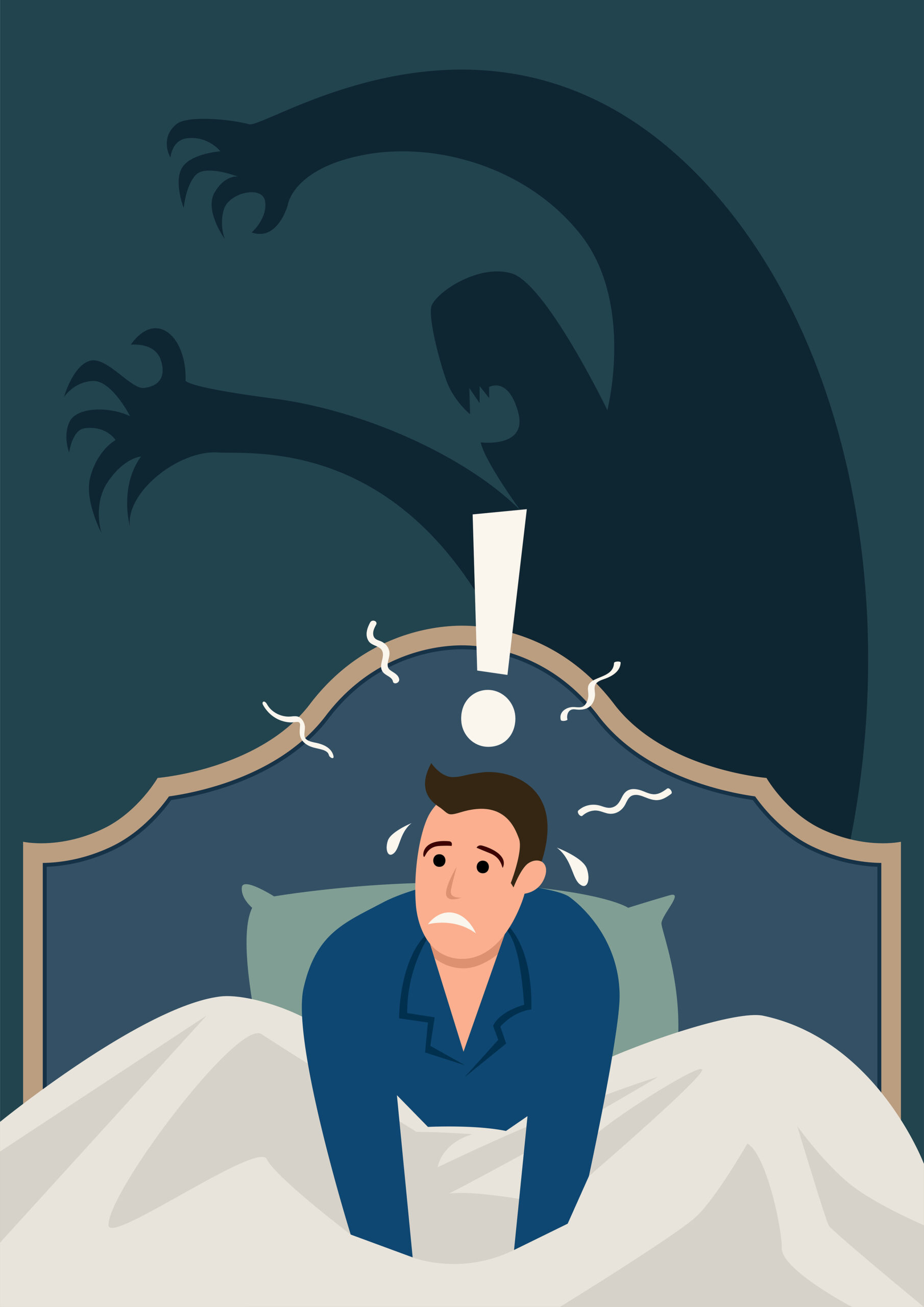Nightmares are dreams that can leave anyone feeling uneasy. They usually involve scenes that are frightening or very stressful. Every person has they from time to time but knowing why helps address more severe issues like Nightmare Disorder. The importance of nightmares goes beyond just feeling scared; it hints at deeper problems needing attention.
While standard nightmares happen now and then, Nightmare Disorder is more serious. It’s when nightmares are regular, very clear, and deeply troubling. These nightmares occur often enough to cause real distress, affecting sleep regularly and causing anxiety upon waking. Moving from usual nightmares to having a diagnosed disorder shows their greater impact on life quality.
Treating Nightmare Disorder is important for keeping healthy. If ignored, it adds to mental health struggles like stress and anxiety, affecting daily functioning. It might also harm thinking, affect emotions, and mess with physical health because of lost sleep or fear of sleeping due to intense nightmares. Seeking nightmare disorder treatment reduces its burden, making the sleep better and life happier.
What Is Nightmare Disorder?
Nightmare Disorder falls under parasomnias, where sleep has unpleasant events. It involves vivid dreams in REM sleep, causing troubled sleep paths. These dreams feel real and distressing, leaving a sense of unease upon waking.
People often mix up Nightmare Disorder and night terrors due to similar names. Nightmares happen during REM sleep and are vividly remembered. Night terrors occur in non-REM sleep and bring intense fear but no memory.
Children are likely to have nightmares due to their growth phases. Adults also experience nightmares, often due to stress or trauma. Children with nightmares may resist sleep or feel anxious, needing help from parents. Adults may seek different therapies for managing nightmare disorder or relieving underlying causes.
Recognizing the Symptoms of Nightmare Disorder
The hallmark of Nightmare Disorder is experiencing frequent bad dreams that disturb sleep. These scary dreams often revolve around danger, fear, or threats. People usually see these dreams multiple times a week, affecting how well they rest.
Nightmares can cause the body to show stress through rapid heartbeats or sweating. These physical signs mean the body reacts to the nightmare stressfully. Noticing these symptoms helps in understanding how sleep disorders and nightmares connect.
After waking from such dreams, you might feel worn-out with trouble concentrating during the day. Your daily routine suffers due to these bad dreams, impacting mood and mental health. Seeing these effects aids in handling triggers and staying efficient.
Exploring the Causes of Nightmare Disorder
The causes of nightmare disorder include issues ranging from mental stress to biological factors. Problems like anxiety, depression, or past traumas often link with having more nightmares. Fluctuations in brain chemical levels or disturbed sleep patterns can also worsen the situation.
Big life stressors or traumatic events might make nightmares happen more often. Traumatic memories often come back in dreams, causing worry for some dealing with Nightmare Disorder. Lowering stress through therapy or healthy habits can help reduce this effect.
Habits like using drugs or alcohol, irregular sleep habits, and late-night snacks can intensify nightmares. Keeping a steady and healthy daily routine helps support better sleep. Understanding these daily impacts guides people in managing nightmare disorder more efficiently.
Nightmare Disorder vs Night Terrors: Understanding the Differences
Night terrors are different from bad dreams because they’re not remembered. People often wake up in a panic, but they don’t recall details. Understanding these features helps tell the two apart.
Nightmare Disorder causes issues by leaving a strong emotional impact. Nightmares can stick with a person, triggering unease. This needs different treatment than night terrors do.
Many think night terrors and nightmares are the same thing, which isn’t true. It’s important to know the difference for proper help. Educating families ensures the right steps are taken early, helping to address nightmare disorder when it appears.
Associated Risks and Complications of Nightmare Disorder
Experiencing constant nightmares increases the risk of developing mental health conditions. Sleep becomes scary, not restful, making things like anxiety worse.
Frequent nightmares may lead to insomnia, causing fear at bedtime daily. Over time, this sleep loss affects mental and physical health. Immediate nightmare disorder treatment helps avoid additional problems later on.
Ignoring or delaying help for Nightmare Disorder can bring many health risks. It includes long-term sleep disruption and worsening of mental health in general. Being proactive with managing nightmare disorder makes handling stress easier and life better overall.
Diagnosis of Nightmare Disorder in Adults and Children
If nightmares keep happening and affect your daily life, seek help. Getting help sooner can reduce the disorder’s impact on your health.
Sleep specialists use many methods like sleep studies and history checks to find out what’s going on. These methods aim to spot patterns and link them to what might cause the problem.
Understanding if it’s Nightmare Disorder means ruling out other issues like sleep apnea. A clear diagnosis means receiving care that targets what’s causing the problems.
Effective Nightmare Disorder Treatment Options
Enhancing sleep environments and routines can greatly reduce nightmare disorder symptoms. Sleep hygiene practices, like having a bedtime routine and a good sleeping area, help improve your sleep quality.
Both Cognitive Behavioral Therapy (CBT) and Imagery Rehearsal Therapy (IRT) are effective psychological strategies for treating nightmare disorder. These therapies help change negative thoughts, promoting a calming mindset beneficial for better sleep.
For some individuals, medications like prazosin work to lessen nightmares. In some situations, medical interventions provide added support along with traditional therapy techniques.
Emerging Theories: Dream Psychology and the Subconscious
In India, people view dreams through lenses of tradition and destiny. These ideas influence how nightmares are seen, blending ancient and current understandings.
Looking into nightmares might show what the subconscious is trying to say. These dream symbols could show conflicts, fears, or hidden wants that can be explored for self-awareness.
Therapists support individuals in seeing dreams as paths to facing life issues. This method helps manage nightmare disorder while encouraging growth by understanding our hidden mind.
Supporting Loved Ones with Nightmare Disorder
Understanding how best to support someone with nightmare disorder can make a profound difference in their healing journey. Here are practical tips to assist them effectively:
- Listen actively to their concerns without judgment. Creating a safe space for them to express feelings can ease their stress.
- Establish a consistent bedtime routine to foster better sleep practices. A calm environment reduces the risk of nightmares.
- Encourage them to keep a dream journal. Documenting dreams helps identify triggers and themes that could be addressed.
- Promote the importance of stress management techniques, like yoga and meditation, to help alleviate tension.
- Familiarize yourself with effective nightmare disorder treatment options, such as therapy or medication, and be supportive of their treatment choices.

